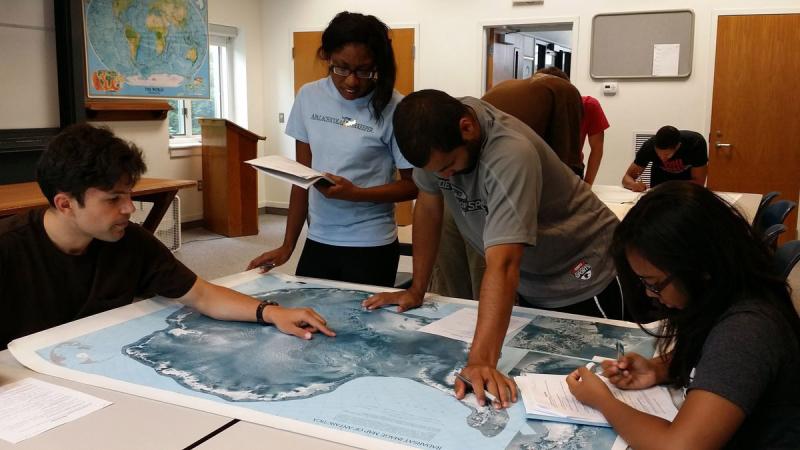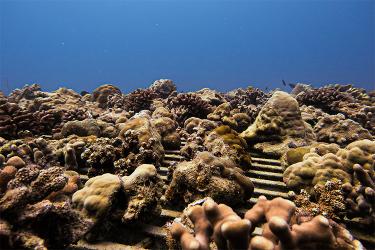Sixteen students from colleges and universities around the country will arrive in Woods Hole on June 1 for the summer. All will be members of the 11th class of the Woods Hole Partnership Education Program (PEP), which was started in 2009.
PEP is a project of the Woods Hole Diversity Initiative, founded in 2004 by the six scientific institutions in Woods Hole to attract and retain a more diverse workforce, one that reflects the changing demographics of the nation and the world. This year PEP is also celebrating its 10th anniversary with a workshop and weekend of activities June 27-29.
“We’re starting our second decade this summer, and we’re really excited about the students who are coming to join us,” said George Liles, director of the Northeast Fisheries Science Center's academic programs and PEP. “Once again, we have students coming from every corner of the country, from large research universities and small liberal arts colleges, and from a variety of ethnic and cultural backgrounds. PEP brings a diversity of talent that makes the Woods Hole community a better place to live and work.”
Course, Research Project Earn Credits
Each year PEP staff travel to campuses and conferences during the winter months to meet and talk with students from minority groups that are under-represented in marine and environmental sciences. The program recruits college juniors and seniors who have had some course work in those sciences, and provides housing, a food allowance, a stipend, and intensive mentoring and career-building opportunities.
PEP students earn four college credits from the program’s academic partner, the University of Maryland Eastern Shore. Students first complete a four-week course focused on global climate change, taught by research scientists from the Woods Hole science institutions. Then for the next six weeks they work on individual research projects under the guidance of a research mentor from one of the PEP member institutions, culminating in a public presentation of their research results on August 9.
Outside of their academic pursuits, students spend five days aboard the Sea Education Association sailing school vessel Corwith Cramer. At sea, students are both scientists and crew members, learning oceanographic research techniques, sail handling, and ship's navigation. A variety of career and social activities are also offered, often in the company of other college students spending the summer at laboratories in the village.
Learning about PEP from Different Sources

Many of the students first hear of Woods Hole and Cape Cod when they find out about PEP. Most learn about the program when a PEP staff member visits their campus, through college faculty members or academic advisors, while searching online for summer internships, or by word of mouth and networking.
“The Woods Hole science community has embraced PEP and stepped up to provide wonderful opportunities for our students,” Liles said. “This year, nine of our 16 research mentors are new to the program. The PEP research mentors are an enthusiast group of scientists who are committed to mentoring young scientific talent.”
Including this year's class, 169 students have passed through PEP in the past decade, hailing from 99 public and private colleges and universities around the United States, including 21 minority-serving institutions. This year, three PEP students will have research mentors at NOAA Fisheries Woods Hole Laboratory, seven at Woods Hole Oceanographic Institution, and two each at the Marine Biological Laboratory, U.S. Geological Survey, and the Woods Hole Research Center.
Students in the class of 2019 are studying at Beloit College; Georgia State University; Hampton University; Illinois State University; Morehouse College; North Carolina Central University; Northeastern University; St. George’s University; Texas A&M University, Galveston; University of Arkansas, Pine Bluff; University of California, Santa Cruz; University of Maryland Eastern Shore; University of South Carolina, Columbia; University of Texas, El Paso; and Wellesley College.
PEP Staff Include Alumni
Many PEP alumni have gone on to graduate school, participated in other programs offered by PEP institutions, or found employment in the marine and environmental sciences field, including positions at Woods Hole science institutions. Some have returned to PEP in a different capacity. Adrienne George, a member of the first PEP class in 2009, is returning for a third summer as PEP student coordinator. In between summers working with PEP, she teaches environmental science courses as an assistant professor of biology at the University of Tampa.
Kwanza Johnson, a member of the 2016 PEP class, is working with PEP again this year as part of her duties as the Northeast Fisheries Science Center's Academic Programs Coordinator. George and Johnson will join PEP director George Liles and Ben Harden of the Sea Education Association to form the team that makes the program run smoothly. Harden is the PEP course director, and teaches and mentors students. Liles also teaches a writing seminar as part of the program.
Ambrose Jearld, founding director of PEP who retired from the Northeast center in 2016, continues to play a role with PEP as a recruiter and mentor, and serves as the Sea Education Association’s senior advisor to PEP.
"It is gratifying to see PEP alumni finding their way into the STEM work force, here in Woods Hole and around the country, in colleges and universities, and in private and government research laboratories,” Jearld said. “We are looking forward to hearing some of the many PEP success stories when the alumni return in late June for our tenth anniversary observance."
Participating Woods Hole scientific institutions in PEP are: NOAA’s Northeast Fisheries Science Center, Marine Biological Laboratory, Sea Education Association, United States Geological Survey, Woods Hole Oceanographic Institution, and Woods Hole Research Center.



